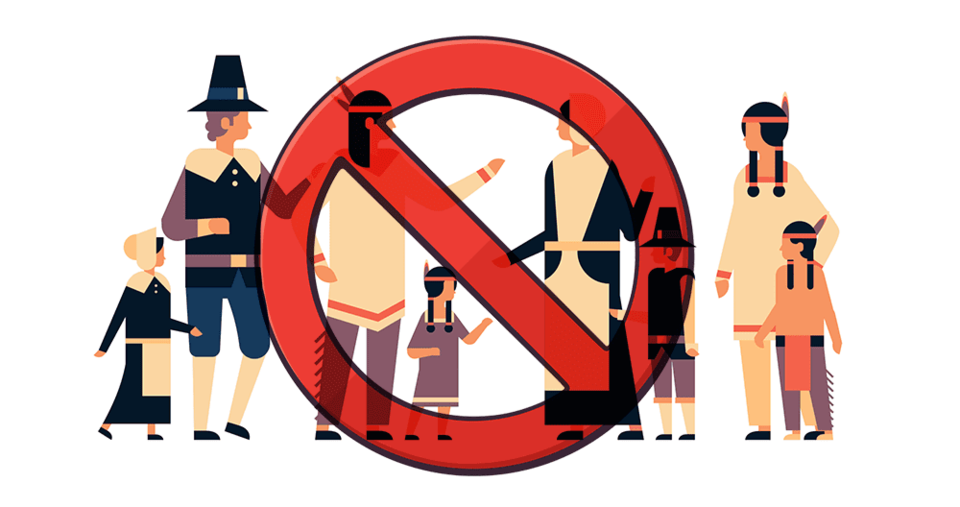In our house, Thanksgiving is something that happens often. It is a practice of the Oneida people to offer thanks frequently in the form of our Thanksgiving address. These words— traditional Oneidas are taught —are the very first words we were given as a people, and we are to start and end our days, our gatherings, and live our lives, with these thoughts of thankfulness.
Life itself —be it a plant life, an animal life, an ancient tree, or a sacred eagle — is a gift to Oneidas. Building a bridge of thankfulness on the foundation of the natural world ascending to the unbounded expanse of the universe with our words of thankfulness is how we honour this gift. The American version of Thanksgiving —perhaps better known to Canadians than the tale of Sir Martin Frobisher — is very different from our words that come before all else.
This United States propaganda tells the tale of Protestants fleeing persecution and finding refuge at the table of the waiting and willing Wampanoag “Indians” — please don’t use that word even if my people use it, and even if the Americans still use it. These Indigenous people hand the keys to the kingdom of God’s bountiful American lands to the pilgrims and then disappear into history. The righteous expansion of the Manifest Destiny spreads, and the United States makes the world better and better, year over year.
The truth is that this story is rife with inaccuracy and more importantly sets the stage for a one-sided telling of history that persists to this day. This was not a first contact story between friendly pilgrims and hospitable First Nations people. This story happened in the midst of the brutal colonization of Indigenous lands at the hands of self-interested settlers.
This fictitious framing feeds the myth of terra nullius — the idea that Indigenous people had no perception of property and therefore had no property rights. This is false justification of individual property thefts from collective rights holders. The tales go on to more or less talk about the acquisition of lands from people who had no concept of land value. The truth is that many Indigenous peoples have different values, not no values.
The truth is that many Indigenous peoples have different values, not no values.
While many Canadians pride themselves on sensibilities different from their American friends, the history of colonization is shared. When relationships with First Nations people — like my people the Haudenosaunee — were convenient, covenants like the Treaty of Niagara in 1764 were entered into. When they were not convenient, agreements like the Haldimand Proclamation of 1784 were abused.
Perhaps a better story to share around the Thanksgiving table is the story of the wampums and principles that are the foundation of these agreements. Arguably of Canada itself.
The Two Row Wampum — the earliest North American treaty with the settlers — is about respecting the differences between cultures and non interference; this is something early settler protestants would have valued. The covenant chain was about the shared connection between the Indigenous people and the newcomers, and their duty to look out for one another when called. The One Dish, One Spoon wampum is about sharing the resources from the land.
Like the relationship between early colonizers and Indigenous people, the relationship between Canadians and the land seems only to be a one-way relationship. In Oneida our word for food is tsyunhéhkwas — it sustains us with life. Our tradition teaches us to be thankful for food as it is the building block of life. Every bite is something to be thankful for.
In Canadian culture things are apparently different. According to the year-long Second Harvest research project last year, Canadians waste a lot of food. Some 35.5 million metric tonnes, or 58% of all food produced in Canada, is wasted. That food waste would fill at least 15 Olympic-sized swimming pools each year. That is nearly $49.5 billion dollars worth of food, or about $5 billion more than the entire Federal Emergency Wage Subsidy for COVID-19 this year.
Maybe it is because Canadians are disconnected from their food. The food system in Canada is the fifth largest food exporter in the world, but it is largely dependent on migrant workers. These people in many cases live in poor housing, don’t work in safe conditions, and in plenty of cases are effectively indentured servants. Is this the system that Canadians want?
I know I have a lot to be thankful for, I think Canadians have a lot to be thankful for too. Canadians have the things that sustain their lives — and then some. They have a system that provides a plentiful bounty.
Perhaps instead of emulating the American empire and its values, Canadians can make this day about being truly thankful for their food system, all the workers who help make it a reality, and maybe even look at lessons from the real story of friendship with First Nations people in this shared One Dish, One Spoon territory. ◆
Karl Dockstader, Oneida of the Thames Bear Clan, is co-host of the One Dish, One Mic radio show, Sunday mornings from 10 AM to noon on AM 610 CKTB.



